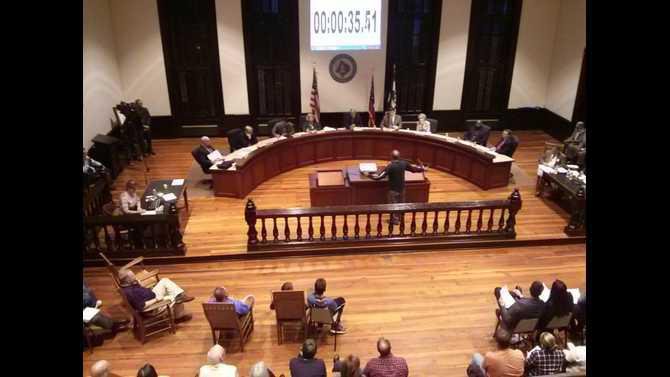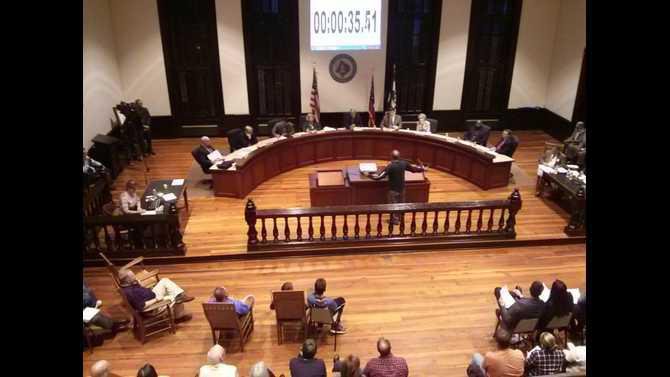To watch the BOC's landfill public hearing click here.
The Newton County Board of Commissioners agreed Thursday to postpone a vote on a contentious landfill settlement after several hundred citizens turned out to voice their opposition to an overly hasty resolution.
The Historic Courthouse was so packed that extra seating had to be provided, with notable representation from the Spring Hill community, as well as public officials including Porterdale Mayor Arline Chapman and Senator Ronald Ramsey.
Charles Wayne Johnson, representing the Spring Hill community located next to the landfill, asked the board to take its time to reach a “just and fair solution to a very complex matter.”
He also recommended a “thorough review of the impact on our community in years to come,” if the county were to agree to the settlement.
Under the proposed deal, the county would lease its landfill to Green Hill 3P, a newly formed public-private initiative that would also include members from the East Georgia Land and Development Company, which recently won a 17-year legal battle to apply for a permit to build a private landfill on 424 acres adjacent to the county’s.
The deal is intended to resolve the lawsuit with East Georgia, which may be entitled to damages, while transferring financial responsibility for the operation of the public landfill to a third party and preventing the construction of another, private landfill.
The landfill and recycling centers currently run at a deficit of about $2 million a year, but critics have accused the county of mismanaging what could be a very lucrative resource worth hundreds of millions. Opponents of the deal also say the threat of East Georgia building another landfill is empty, because the company would face critical obstacles in seeking to permit a second landfill next to an existing one, on a river, in a historically black community. Solid waste facilities are among the projects that have been successfully targeted by environmental justice lawsuits based on the Civil Rights Act.
The primary concerns voiced by citizens pertained to Green Hill’s intention to make the landfill a regional landfill for the state, and increase the average daily disposal from 265 tons a day to more than 1000. Residents questioned the proposal’s environmental impact, accountability mechanisms, traffic implications, and effect on property values.
Chapman read a statement on behalf of the City of Porterdale asking that the county conduct an independent study of the proposal before moving forward. The settlement was written by legal and engineering experts retained jointly by the county and East Georgia.
“We do not want a regional landfill and all the traffic and trash that comes with it,” said Chapman.
Brenda Mullins, another Spring Hill resident, cited a study that found race to be a “significant” factor of the location of solid waste facilities. Spring Hill is a historically black community and home to the Johnson family, who identify as the largest black landowners in the county.
“We simply ask that you slow down,” Mullins said, asking that the county explore alternatives with an emphasis on recycling.
Jacquiline Mckinsey invoked a symbol of black solidarity when she put her hands up, a gesture of protest associated with the shooting of Michael Brown, an unarmed black teenager, in Ferguson Missouri, last year.
“You do not shoot me but you’re killing me with the toxic poison that you’re putting right next to me,” she said.
Dennis Taylor warned that a private company would not be accountable to taxpayers in the way that the county is.
“When you turn over landfills to private companies, you lose control [through] government,” he said.
Senator Ramsey told the board he had received many calls from concerned constituents, and urged the county to “proceed cautiously.”
Attorney Bob Norman and environmental engineer Bill Hodges, who have both been jointly retained by the county and East Georgia, as well as Tee Stribling, representing Green Hill, responded to citizens’ concerns, clarifying several points of the agreement.
In a followup interview, Stribling said most of the concerns aired at Thursday’s meeting had to do with problems in the current landfill, which would be addressed by Green Hill.
“That landfill hasn’t had best practices implemented for some time,” he said. “Odors and litter associated with the landfill are unacceptable.”
While the landfill received an “acceptable” rating on its most recent compliance report on file with the Environmental Protection Division, residents complain of odor, contamination and litter.
Stribling said that Green Hill was the only company that could allow the settlement of the lawsuit between Newton County and East Georgia.
He said that while Green Hill, a private company, would be “happy to make whatever necessary disclosures that we need to,” the identities of the company’s members was not currently available. He also confirmed that East Georgia would be compensated directly by Green Hill through a combination of cash and equity in the company.
The board then voted to postpone the special meeting to next Tuesday’s regular meeting, at which point the commissioners will decide whether or not to vote.
Speaking after the meeting, Connie Boyce, a resident of Lower River Road, where the landfill is located, said she was afraid the BOC would continue to postpone the vote until the public lost interest.
She added that her primary concern was for the Johnson family, who were in danger of losing their legacy and the value of their properties.
“A lot of them are at or approaching retirement and they will be left with nothing to start all over with,” Boyce said.





